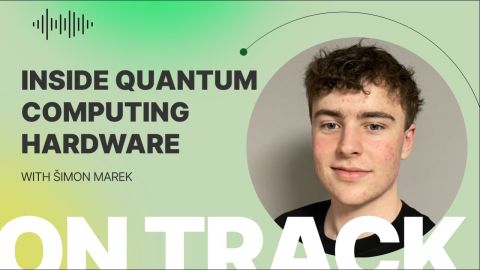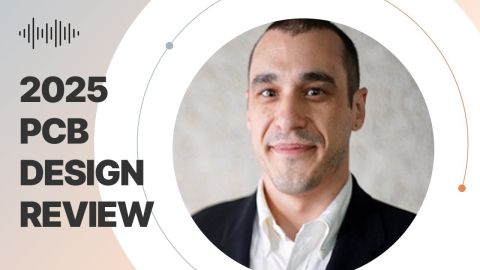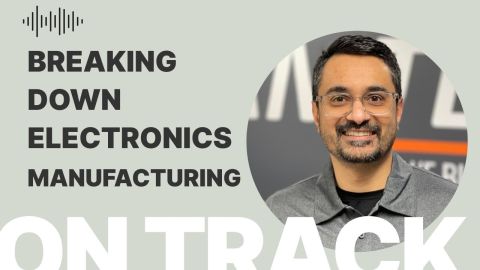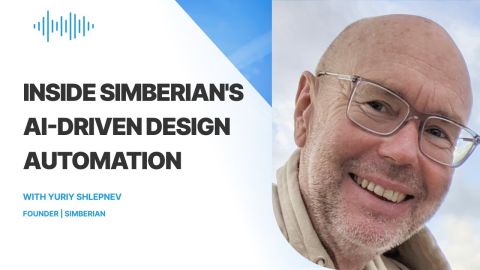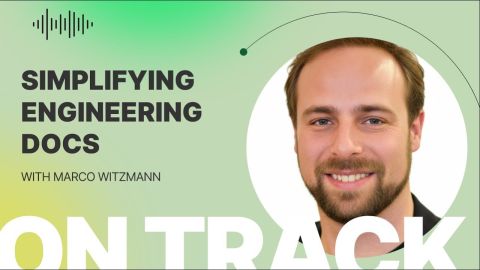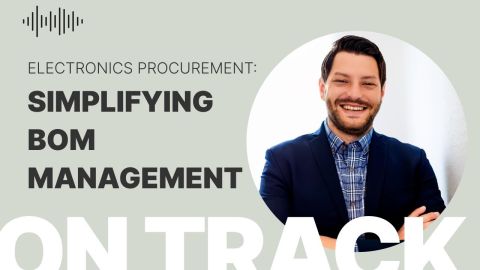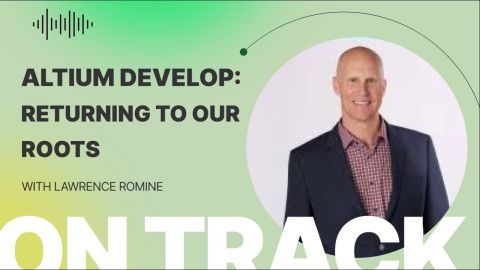The Challenging Role of a Process Engineer

Let’s take a glimpse into a life of a young process engineer. In this episode, our guest Paige Fiet talks about her career path in the world of PCB manufacturing. She will also share how she landed her role as the Student Liaison in the IPC.
Watch this episode through the end or listen on the go. We hope to inspire young engineers to become more motivated to jump into the PCB industry.
Listen to Podcast:
Download this episode (right-click and save)
Watch the video:
Show Highlights:
- Paige shares her story and her exciting career path before she landed her role as a process engineer at TTM Technologies
- Zach and Paige exchange college experiences, they talk about the courses and curriculum then and now
- Paige briefly talks about her experience in getting the role of the IPC Student Liaison
- She also talks about how interested engineers can become involved in the IPC and encourage them to invest in a membership and attend other industry-related trade shows and conferences
- Participating in committees can be a rewarding and fun experience
- Paige had her eyes on TTM from the very beginning. She summed up her role as a process engineer as working on improving processes' efficiency and quality on a daily basis
- Preventing mistakes before they happen is one of the challenging but exciting parts of the job
- There are so many opportunities in the industry and the next generation’s industry expert has a huge room to fill
- Manufacturing misconceptions, Zach and Paige emphasize the exciting opportunities in the PCB manufacturing Industry and encourage young engineers to explore this space
Links and Resources:
- Connect with Paige on LinkedIn
- Visit TTM Technologies website
- Watch Paige Interview: IPC Student Board Member Liaison
- Watch a related episode: IPC CEO John Mitchell on the Supporting American Printed Circuit Boards Act
Connect with Zach on LinkedIn
Visit Nexar website
Visit Octopart website
Claim the special offer for Podcast listeners only
Transcript:
Paige Fiet:
Yeah, thanks for having me, Zach.
Zach Peterson:
I'm always excited to meet young people who get involved in the electronics industry. I can't believe I'm saying young people because I still consider myself a young person, but I just hit that next age bracket that you see on surveys. So I guess I have to refer to other people as young people, but it's always so great to see the next generation getting involved in the industry. So maybe if you could tell us a little bit about your story and then how you got involved in the industry and how you got involved in manufacturing.
Paige Fiet:
Sure. So right after my second year of college I needed an internship. I was going to Michigan Tech for my Electrical Engineering degree and I wanted some hands on engineering experience. So I found a job in my hometown, working on gas mass for the military and they had a really small SMT line. I think they had eight employees total. Two ran the line and then the others were doing through whole assembly and then they had two testers. So I worked with them, I learned all about SMT components, I created a bed of nails for them and just worked alongside them.
The next year I was in college and I wanted to know how those circuit boards were built that I was assembling all summer. I thought it was the coolest thing ever. So I took an internship at Kylo Ren Electronics in Michigan and I somehow got into a class of PCB manufacturing class at Michigan Tech that only had 18 open spots. And there I started learning about manufacturing, hearing from industry leaders like Happy Holden. And then started working in manufacturing at Calumet. Soon I fell in love with that totally, getting your hands dirty and working with the boards and I was so amazed at how much went into making the little board that I'd been working with the summer previous.
Zach Peterson:
So I know that one of the pain points for students and I guess in the industry in general, is access to those educational courses a little bit earlier in the career path. And it sounds like you were able to access some of those resources while you were at university.
Paige Fiet:
Yeah, the class was great. We had a lab and you had a lab partner, so you had two people working with a TA every lab. And then the class was lecture based. So we would hear about what engineers, both in manufacturing and assembly and design do day to day, what their jobs entail and then learn about what they've learned over the past few years.
Zach Peterson:
When I was at university, I got to be honest, printed circuit boards was not anywhere in the curriculum at all. Maybe you got to use an Arduino in a class, but that was about it. That was your only exposure. And then my first exposure was when I was doing research, but the focus was so much on semiconductors and semiconductor manufacturing and I think that a lot of students get attracted to the grand challenge. Everyone says getting over the next hump of Moore's law. And so I think it's understandable that some engineering students will gravitate in that direction. What made you go and jump into circuit boards instead of some other area of electrical engineering? Is it just that they were really cool and impressive to engineer?
Paige Fiet:
Yeah. And a lot of my other labs, like my Circuits two and Circuits three classes we're just dealing with breadboards and through whole components and circuit layout and design. And I wasn't amazing at it like some of my other students were. I enjoyed it but I wasn't great at it. And then I found this circuit board manufacturing class and I just loved it. Getting to work with my hands and mixed chemicals and make the different layers. I just thought it was so cool.
Zach Peterson:
I definitely understand that feeling because I'm a pretty hands on person myself and when I was younger I was working at a cabinet shop, so I always use tools and felt like you had to do stuff with your hands. So I get that. I think I get that attraction a bit more. But once you got into the industry, how did you become involved with IPC?
Paige Fiet:
Yeah. So my professor from that class that I took, we became pretty close. I started TA-ing his class working with Callum Matt, learning about the IPC standards that I hadn't really heard about in my other classes. And IPC's Education Foundation reached out and they were looking for a student liaison for the first time ever for the Board of Directors. And so my professor sent me an email and he said, "I really want to nominate you for this position". And I was like, "What? I don't think I would be good at that. Are you sure you want to nominate me"? So I let him go ahead. I filled out this whole application on my end. We get sent home for Covid-19, two weeks after I applied. And then I get a notification that I was in their top seven nominations in the country.
So I was like, "Well that's great, but I don't think I'm going to get it". So from that point, they let all the student chapters across the nation decide who they wanted to be the new student liaison. And I got picked, I remember telling my parents and they were like, "That's so crazy". And then my first year was spending time on calls with the Board of Directors because we couldn't travel anywhere, we couldn't meet each other. We just spent nine hour meetings over Zoom.
Zach Peterson:
I know those meetings can be irritating, but I think it's important to have that opportunity to participate in those things. And my view is, I mean I've sat on some standards committees and my view is if you have something to give to the industry, then you should probably do it. But I think I'm wondering what exactly was that like? What does the student liaison do with the Board of Directors? Is this to make sure that the concerns of the students members are heard and understood by the Board of Directors as they make broader decisions?
Paige Fiet:
Essentially it was all what do the students want? How do we bring awareness to our colleges? How do we get this younger industry involved? And for me, just sitting on the board alone was a projectile into the industry. I started attending meetings, I started meeting people, and you can really feel the love that these die hards have that have been in the industry for 40 years. And meeting those started to create this own love and passion inside of me.
Zach Peterson:
I've met quite a few people who are more experienced than myself, and so I totally understand what you mean about that infectious love of electronics and especially manufacturing. And I've tried to make it my mission over the last year or so to learn as much as I can about manufacturing. And I think interfacing with those much more experienced people is a really important part of that.
Paige Fiet:
Agreed wholeheartedly.
Zach Peterson:
And I mean you get so much firsthand experience from them, just like they'll tell you stories. They'll tell you some of the crazy things that they dealt with when they were building boards and you can just learn so much.
Paige Fiet:
Agreed. I love hearing about the old technologies and how circuit boards started. They were there at the forefront of that.
Zach Peterson:
Yeah, that's always fun. I think it's important to get the historical context for how we got to where we're at now. And then I think what's really great about the historical context is you learn about the engineering challenge that was confronted at the time.
Paige Fiet:
Agreed. And you learned so much about what the original intent behind something was and then how it became what it is today. It's so crazy to me.
Zach Peterson:
Yeah, totally agree. So if you go on IPC's website, and I think specifically the educational foundation website, your picture is there, but I'm wondering how does someone who is just getting into the industry and passionate about electronics, how do they get involved with something in IPC and what can they get involved in?
Paige Fiet:
Yeah, I always recommend going to the trade shows, like Apex I think is a huge one for IPC. They actually have an emerging engineer program that I'm in right now. You get a mentor in industry. So I have an industry expert who's been in the industry for years and years and years and years. And they help introduce you to people. They help you get on committees, you're meeting with other young people that are just entering the industry as well. You get hands on experience and you get learn from your peers. I think it's a great experience.
Zach Peterson:
Would you recommend somebody whose maybe newer in the industry consider joining IPC? Or is there not an individual or a path in, I guess for individuals it is. Is it only corporate memberships?
Paige Fiet:
There is individual membership as well as the corporate memberships. I think the corporate membership does make it a little bit easier. But individually, I think it's so worth your time to sit in on a few committee meetings, hear how the standards are created and learn from past and future engineers.
Zach Peterson:
The standards committees I've sat on are IEEE and Antsy. I've never sat on an IPC Standards Committee and I'll be honest, it's something I have considered getting into recently. But I think the challenge, and this just for me is knowing which set of standards I should be aiming for to try and participate in. How do you think someone can go and figure that out for themselves? Is it just based on where do they operate in terms of technical expertise or should you look for a problem that you can help solve and jump into standards participation that way?
Paige Fiet:
Yeah, I think both. Sometimes I sit on committees that I might have an interest in like design and I have no experience in and I'm just a fly on the wall listening. And then there's other committees like the Solder Mass Committee that I co-chair and I'm helping leading the new standards for solder mask. And so I think a little bit of both. It's what you're experienced in as well as what you might want to learn more about.
Zach Peterson:
So Solder Mask Committee. So this is a good example of the stuff that goes on in standards committees. For anyone that's out there that's listening that has never participated in this kind of thing, it seems like its something that's so minute and an afterthought. So maybe you can explain what goes on in a Solder Mask Standards Committee meeting.
Paige Fiet:
Oh man. I think each committee has its own personality. It's funny. Each group operates a little bit differently. Solder mask is a little bit of a smaller one, but we talk about flammability ratings and different test methods for testing your solder mask as well as creating standards for debris in the mask, mask openings, the thickness of the solder masks, things of that nature.
Zach Peterson:
So sometimes the standards committees that you're on, at least the ones that I've been on, I know that sometimes the minutia can become this subject of a heated debate. Is that something that you've experienced dealing with something like the Solder Mass Committee?
Paige Fiet:
Not in solder mass particularly, but I sat in an assembly committee once and they had an argument on what defines a hole and what defines a void in the solder for a couple of hours.
Zach Peterson:
For a couple of hours. Just the definitions.
Paige Fiet:
Yeah.
Zach Peterson:
That's always fun. Well, I guess in those situations you can sit back with your coffee and get some work done in the background while they hash it out.
Paige Fiet:
It's true. But it's also so interesting. People are so passionate about their jobs and what they do that they're arguing about what's a hole and what's a void.
Zach Peterson:
I know. Well, I guess it seems so insignificant on the surface, and if you just back out, it's like, why aren't they synonymous? But I guess when you really get down to some of the nitty gritty with reliability, then you can really see, oh, this actually does matter and we have to hash this out.
Paige Fiet:
Agreed, totally.
Zach Peterson:
Yeah. So now I mentioned at the beginning of the discussion that you work at TTM. So maybe you can tell us how you came to work at TTM and what you actually do at TTM.
Paige Fiet:
Yeah, so I was actually pretty interested in TTM from the start of my industry experience. They are the number one circuit board manufacturer in the United States, and I wanted to work for a powerhouse like that. I thought it was great. And then I also wanted to come live in the mountains, so I moved myself from Michigan to Utah and I work at the Logan Division. I'm a process engineer for our Solder Mass Department. It's one of our biggest departments at this facility. I do the day to day efficiency, quality, and then working with my operators on their processes and how to improve.
Zach Peterson:
So when you say process engineer, can you break that down a little bit more as far as what's involved in process engineering? Because I think it's an important area of manufacturing and I think a lot of students who may want to get into manufacturing might find themselves with that job title at some point along their journey.
Paige Fiet:
And I think process engineering is a great way to start for most engineers. If you don't know anything about a topic, you're hands on. I probably spend 40 to 60% of my time on the floor. I know how to run all my equipment, I'm figuring out any quality issues. I'm working with my operators very closely. I am trying to figure out how we can push more panels through every day. That's a big thing about process engineering is looking at your efficiency. What can you do better? What can you do leaner? How can you make your quality better? How do you prevent problems that you've been having?
Zach Peterson:
So I guess in terms of the engineering problem that you're trying to solve, it's try to maximize throughput while minimizing defect, counter maximizing yield, however it is you quantify yield.
Paige Fiet:
Right, and I think most people would think that you'd be working with robots, but it's very human and humans make mistakes by default. And so it's a lot of like, "Well, how do you prevent that mistake? How do you be smarter than the machines that they're dealing with? With the people and preventing their mistakes before they happen"?
Zach Peterson:
Well, and you brought up working with robots. One of the things that I think comes up often in the on shoring discussion that has been going on broadly is a big investment in automation and especially in automation within PCB factories. Is that something that you think changes the role of a process engineer from someone who's just running machines to someone who now has to command and control the robot essentially?
Paige Fiet:
Yeah, I think it's a different set of problems. So people might make mistakes, but machines mess up sometimes too. And they take different levels of controls and sensors can go out and wheels can break and gears can fall off. And you can have all sorts of other issues than you would have with somebody dropping a panel.
Zach Peterson:
And so at that level it sounds like you actually have to get in and diagnose some of those things and determine is the line down for maintenance? Do we got to call somebody?
Paige Fiet:
Yeah. And that's some of my favorite parts is digging into it and finding the issues.
Zach Peterson:
Definitely. Although I will admit when I was working in a lab, I preferred not to have to fix everything, but I get what you're saying, because at some point, if something's not working, you got to pull open that piece of equipment and try and find out what's wrong.
Paige Fiet:
And I mean that's what you have a maintenance team for. But initial investigation, it's very fun.
Zach Peterson:
That's true at a larger company I guess, and probably a larger facility where you're at, you probably do have a dedicated maintenance team that comes in and handles all this stuff, ensures uptime, things like that.
Paige Fiet:
Yeah.
Zach Peterson:
So how long have you been at TTM?
Paige Fiet:
I've only been here a year, so I actually just graduated in December of last year.
Zach Peterson:
So what does the career path look like for someone in your position who's just come in as a process engineer, working at a big manufacturer? What does the future look like for someone in your shoes?
Paige Fiet:
Personally, my goal is to learn more processes outside of solder mass in the next few years and then work my way into operations. That's just what interests me. Anyone at any facility really or any company can figure out where they want to navigate what they want to do.
Zach Peterson:
Well, I guess based on that response, it sounds like there's a lot of room for growth for a young person who's coming in and just getting started in process engineering.
Paige Fiet:
And I think a lot of the industry has that growth because they were lacking for so long that middle generation or this younger generation. I feel like the industry alone just has so much opportunity.
Zach Peterson:
I would agree with you. I know that the age distribution is a bit bimodal, so there's a cluster of folks who are much more experienced and there's a cluster of folks who are much less experienced and there's not a lot in the middle. Is that actually something you notice working at a larger company?
Paige Fiet:
A little bit here and there. We have our industry experts and then we have our younger generation. But again, when you go to Apex and stuff, you see the same thing.
Zach Peterson:
I have particularly noticed the same thing at PCB West, PCB East, so I get exactly what you're talking about. And there was of course recently a report from IPC and then a survey from PCEA looking at the demographics. And then they identified that as well with a wave of retirements coming up on the horizon. So it really sounds like there's a lot of room for growth for young people coming into this industry.
Paige Fiet:
And I think that's one of the most exciting parts is that you get to become the new subject matter expert in whatever topic you want to learn because those people are going to be retiring in the next five, 10 years.
Zach Peterson:
Yeah, I totally agree. I think there was one thing that prevented me from going into manufacturing, at least when I was your age, which wasn't that long ago, but still my parents' generation saw manufacturing as something that was not really for a younger person and they expected you to go off and be a lawyer or a doctor and worked in the office. And I continue to be impressed by the technical challenges that folks who work in manufacturing have to deal with. Do you find that you actually really get pushed to your technical limit at some points in doing your day job?
Paige Fiet:
Yeah, I do. And I think a lot of students in college I found wanted to sit at desktops and they wanted to be designers and work on software and they didn't really want to work in a factory where they were making things and dealing with people and solving quality issues. And that's something that I found that I absolutely loved. I'm constantly being pushed on problems. And it's not like when you're in school and you have a problem and it takes you an hour to solve. This is a problem that might last you a day, a week, a month. And so it's constant problem solving and reinventing your skills and learning how to solve different things.
Zach Peterson:
Well, I guess what I'm getting at, is there a perception or was there a perception at least for you, that a job in manufacturing was not an engineering job, that it was a tantamount to manual labor almost?
Paige Fiet:
I think there still is that perception, and I guess I probably snuffed up my nose a little bit too until I started working with manufacturing and learning that it's actually harder than it looks on the surface.
Zach Peterson:
So here's what I'm getting at. So the thing for you that actually caused you to connect the dots was actually jumping in to these internships and then getting involved. And I think that was when the light bulb went off.
Paige Fiet:
Working with those other engineers and seeing that they were very smart and very technically skilled and that their jobs are hard, harder than I assumed they would be.
Zach Peterson:
So I'm wondering if that's really the key to getting more students and young people involved in manufacturing, especially in the circuit board industry, because I think there's a lot of young people who have those skills in them to do really well in manufacturing and maybe they go into semiconductors and then they get burnt out and go somewhere else. And then it's almost like we've lost that talent. So I've been wondering what can we do to get more young people involved in manufacturing? And it almost seems like seeing is believing.
Paige Fiet:
Yeah, I think that's a huge part of it. And I think people, especially students, want to be on the front end of technology and I don't think that they realize that circuit boards are still evolving and our technology's getting more and more advanced as days go on. And once you build that foundation and you learn your processes, then you can start learning how to build substrates and how to build semiconductors and be on that front end.
Zach Peterson:
Yeah, I think there's even still this perception that the circuit board is really an afterthought. It's not something that's heavily engineered or it's not something that requires very specific practices to ensure that it works properly. It's just an overblown way to wire chips together and then it's just ignored.
Paige Fiet:
Yeah, I think the same perception exists, and it's so hard because they're custom. No board looks the same as another board from another company that you're building for. They all have different materials and different layouts and different layer counts and all kinds of different features. And so they all have their own challenges.
Zach Peterson:
Yeah, I agree. I saw myself when I was younger going into Intel or another fab and throwing on the bunny suit or doing something in metrology because I used a lot of microscopes when I was doing research. And so I thought that's where I would go. And once I started doing design, I really saw the light and it clicked for me, oh, you have to actually very precisely engineer this. You can't just throw it all together and expect it to work.
Paige Fiet:
It takes so much consideration on all steps, the process, right design and then manufacturing and then assembly, and there's so much thought that has to go into it to even build your smartphone.
Zach Peterson:
Yeah, I think smartphones are really the place where I think the rubber can meet the road for some students. So I don't know what universities have to do specifically in terms of how they structure their programs to get students to maybe pursue this industry a bit more. But I'm wondering if those examples are going to be convincing.
Paige Fiet:
I agree. And I think even telling my operators what we build every day and what products they go into, their eyes get all big and they're like, "Really? That's so cool". And so maybe that's a way to engage students too, is say, "Who builds your computers? Who builds your smartphones? Who builds your tablets? And how do you design those? And then how do you fabricate that"?
Zach Peterson:
Yeah, that's true. There's so much focus on the chip, there's so much focus on the semiconductor and even with the media because over the past 18 months it seems like the story has just constantly been on the media, chip shortage, chip shortage, chip shortage, over and over again. And everything else that goes into the end product, which is arguably many more components than just the chip. All of that just gets lost and no one focuses on it.
Paige Fiet:
It does. I agree.
Zach Peterson:
Yeah. Yeah, I agree too. Well, thank you so much for joining us. I know we're getting up there on time, but I think as a final thought from you, it would be interesting to see if you could maybe suggest some of the things that you think would engage students a bit more to help them get involved in an organization like IPC.
Paige Fiet:
Yeah, I think at the college level, joining clubs, I know IPC and IEEE have clubs in student chapters at a lot of colleges, so I definitely recommend getting involved with those, reaching out to your local companies in your college town or you are in your hometown, figuring out if you have manufacturers or assemblers or designers? I think there's a lot more out there than people realize in the US. And then go to those trade shows, sit in on a room, be the fly on the wall. I did it for a few years.
Zach Peterson:
I agree. Go to the trade shows. I have gotten, every time I go, so much information, always learning something new. So it's great to hear that you also advocate for the trade shows.
Paige Fiet:
Yes. I love the trade shows. I love seeing what's coming and equipment to make the circuit boards. I love meeting with old friends and learning tons of stories.
Zach Peterson:
Absolutely. Yeah. And the networking is so valuable.
Paige Fiet:
So important.
Zach Peterson:
Absolutely. Well, Paige, thank you so much for joining us. This has been a great discussion. And as I said earlier, it's always great to meet young people who are involved in the industry and especially who are involved in manufacturing. Thank you very much.
Paige Fiet:
Yeah, thanks for doing what you're doing, Zach.
Zach Peterson:
Oh, I try. Thank you. And to everyone out there that's been listening, we've been talking with Page Fiet from TTM, also heavily involved in IPC. We're going to have some links in the show notes that you can go and learn more about IPC and some of the initiatives that IPC is involved in with Altium. Make sure to hit subscribe. If you're watching on YouTube, hit that like button on the video and you'll be able to keep up with all of our upcoming episodes and updates. And finally, don't stop learning. Stay on track. We'll see you all next time.

